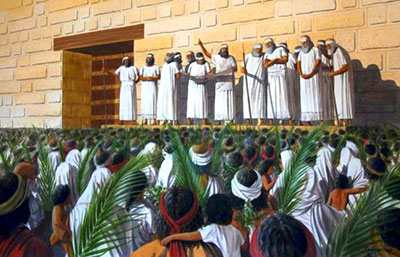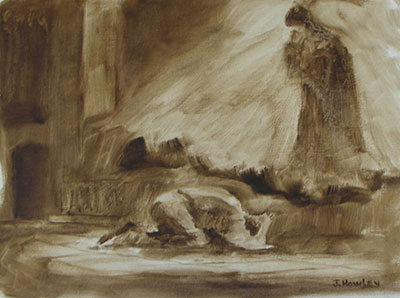
The Know
2 Nephi 4:16-35, known by many Book of Mormon readers as “Nephi’s Psalm,”1 expresses Nephi’s personal hopes, joys, sorrows, and trials. Interestingly, Nephi's Psalm shares many parallels, in both style and wording, with Psalms of the Old Testament.2
LDS scholar Matthew Nickerson3 established that Nephi’s Psalm fit the biblical psalm type termed “individual lament,” which has five structural units: 1) invocation, 2) complaint, 3) confession of trust, 4) petition, and 5) vow of praise.4
- Invocation: 2 Ne 4:16-17
- Complaint: 2 Ne 4:17-19
- Confession of Trust: 2 Ne 4:20-30
- Petition: 2 Ne 4:31-33
- Vow of Praise: 2 Ne 4:34-35
LDS scholars Kenneth Alford and D. Bryce Baker have highlighted similarities in the structure and language of 2 Nephi 4 to wording found in the sequence of Psalms 25 to 31.5 This group of psalms is mostly composed of individual laments and also songs of praise and thanksgiving to the Lord. Some of the shared language includes:
| Nephi's Psalm (2 Nephi 4) | Parallel in Psalms 25–31 |
|---|---|
| 2 Nephi 4:17, 19 "great goodness of the Lord, in showing me his great and marvelous works"..."I know in whom I have trusted" |
Psalm 31:19 "Oh how great is thy goodness...which thou hast wrought for them that trust in thee." |
| 2 Nephi 4:17–19 "my soul grieveth because of mine iniquities" and "my heart groaneth because of my sins" |
Psalm 25:17–18 "The troubles of my heart are enlarged...Look upon mine affliction and my pain; and forgive all my sins." |
| 2 Nephi 4:23, 25 "he hath heard my cry"..."I will lift up my voice unto thee; yea I will cry unto thee, my God" |
Psalm 30:8 "I cried to thee, O Lord; and unto the Lord I made supplication." |
| 2 Nephi 4:26 "[The Lord] hath visited men in so much mercy" |
Psalm 25:6 "Remember, O Lord, thy tender mercies and thy loving kindnesses, for they have been ever of old." |
| 2 Nephi 4:20,29 "mine afflictions" |
Psalm 25:16 "I am desolate and afflicted" |
| 2 Nephi 4:22, 27, 29–33 "mine enemies" |
Psalm 27:11–12 "Lead me in a plain path, because of mine enemies. Deliver me not over unto the will of mine enemies." |
| 2 Nephi 4:28 "Rejoice, O my heart" |
Psalm 28:7 "My heart trusted in him, and I am helped; therefore my heart greatly rejoiceth." |
| 2 Nephi 4:31 "O Lord, wilt thou redeem my soul?" |
Psalm 25:20 "O keep my soul, and deliver me." |
One important aspect of the series of Psalms 25 to 31 is their focus on the themes of temple and covenant.6 According to Psalms scholar Peter Craigie, Psalms 25 and 28 should be read in the context of a covenant-making ceremony (see, e.g. 25:10, 14; 28:4, 7). Craigie notes:
The attitude of trust is the key to the psalmist’s preparation, for trust signifies dependence and hope based upon the covenant character of God. He trusts because God is faithful as the God of the covenant promises; he trusts because those who have trusted in the past have experienced the presence and help of God.7
As part of this covenant-making process, the psalmist typically does five things:
- He recognizes his sins
- He pleads for forgiveness so that the covenant curses come not upon him, but that they fall upon his enemies, the wicked
- He dedicates himself to keeping the covenant/commandments of the Lord
- He petitions the Lord to guide him in the right way
- He rejoices because of the Lord’s help and thanks/praises God
Nephi's Psalm shares all of these covenant-making features.
The preceding is only a small sampling of the many parallels in structure, language, and themes that are shared between the Psalm of Nephi and the Psalms of the Old Testament. It is clear that Nephi had oral or written knowledge of the wording and style of those biblical psalms (especially those that may have been contained on the Plates of Brass) and that he very skillfully utilized this literary knowledge in the writing of his own poetical and soul-felt composition.
The Why
Readers can draw deep spiritual strength from Nephi's Psalm as they relate to the five phases typically present in the covenant language of the Psalms. People are encouraged to honestly recognize their sins, shortcomings, and faults, as Nephi confidently confronted his own challenges and anger. Worshippers then find in Nephi a role model for sincere pleading with the Lord for forgiveness. They then see Nephi rededicating himself to his covenants with God, and committing himself to follow the right path. Finally, the faithful then openly express their joy in gratitude for the goodness and redemption of the Lord.
In this psalm, Nephi shows that he was a skilled author and a brilliant student of the Scriptures. All of his writings regularly demonstrate his ability to integrate scriptural words and phrases. The fact that the "Psalm of Nephi" borrows so extensively from a number of different biblical psalms is evidence that Nephi knew and cherished many of the biblical Psalms, that he joyously used them in his daily life and writing, and that the inspired words of the Scriptures, including the Psalms, were very dear and comforting to Nephi.
Finally, the fact that Nephi structures his psalm on the pattern of some of those in the Bible that deal with temple and covenant imagery should indicate to us that the temple is truly a place of refuge from the storms of our lives and that there is safety and direction in keeping the covenants that we make there.
Further Reading
Kenneth L. Alford and D. Bryce Baker, “Parallels between Psalms 25–31 and the Psalm of Nephi,” in Ascending the Mountain of the Lord: Temple, Praise, and Worship in the Old Testament (2013 Sperry Symposium), ed. Jeffrey R. Chadwick, Matthew J. Grey, and David Rolph Seely (Provo, UT: Religious Studies Center, Brigham Young University; Salt Lake City: Deseret Book, 2013), 312–28.
John Hilton III, “Old Testament Psalms in the Book of Mormon,” in Ascending the Mountain of the Lord: Temple, Praise, and Worship in the Old Testament (2013 Sperry Symposium), ed. Jeffrey R. Chadwick, Matthew J. Grey, and David Rolph Seely (Provo, UT: Religious Studies Center, Brigham Young University; Salt Lake City: Deseret Book, 2013), 291–311.
S. Kent Brown, “Nephi’s Psalm,” in The Book of Mormon Reference Companion, ed. Dennis Largey. Salt Lake City: Deseret Book, 2003.
John W. Welch, “The Psalm of Nephi as a Post-Lehi Document.” Insights: A Window on the Ancient World. June 1999.
David Bokovoy, "From Distance to Proximity: A Poetic Function of Enallage in the Hebrew Bible and the Book of Mormon," Journal of Book of Mormon Studies 9, no. 1 (2000): 60–63.
- 1. The appellation “Nephi’s Psalm” appears to have been coined by Sidney Sperry in Sidney B. Sperry, Our Book of Mormon (Salt Lake City: Stevens & Wallis, 1947), 110–11.
- 2. Steven Sondrup conducted a study on these verses in order to evaluate their poetical value. He noted that the passage contains structure, rhythm, parallelism, chiasms, verbal pairings, couplets, triplets, and other features of intentional poetic structuring. Furthermore, Sondrup concluded that “logical, formal or conceptual units are set parallel one to another” as they are in the Hebrew poetry of the Old Testament. See Steven P. Sondrup, “The Psalm of Nephi: A Lyric Reading,” BYU Studies 21, no. 3 (1981): 357-372. Formatting added.
- 3. Matthew Nickerson, “Nephi’s Psalm: 2 Nephi 4:16–35 in Light of Form-Critical Analysis,” Journal of Book of Mormon Studies 6, no. 2 (1997): 26–42, at 30.
- 4. For examples in the psalms of “individual laments” with this basic structure, see Pss 3, 5-7, 9, 12-14, 17, 22, 25, 28, 31, 35, 38, 39, 51, 53-58, 61, 64, 69-71, 77, 83, 86, 88, 102, 109, 130, 139-44.
- 5. Kenneth L. Alford and D. Bryce Baker, “Parallels between Psalms 25–31 and the Psalm of Nephi,” in Ascending the Mountain of the Lord, 312–28. See also John Hilton III, “Old Testament Psalms in the Book of Mormon,” in Ascending the Mountain of the Lord: Temple, Praise, and Worship in the Old Testament (2013 Sperry Symposium), ed. Jeffrey R. Chadwick, Matthew J. Grey, and David Rolph Seely (Provo, UT: Religious Studies Center, Brigham Young University; Salt Lake City: Deseret Book, 2013), 291–311.
- 6. Although not so much in Psalm 31, these themes are clear in all of the other psalms in this series.
- 7. Peter C. Craigie and Marvin E. Tate, Psalms 1-50, World Biblical Commentary, vol. 19, Bruce M. Metzger, gen. ed. (Second Edition; Nashville: Thomas Nelson, 2004), 218.
Continue reading at the original source →





